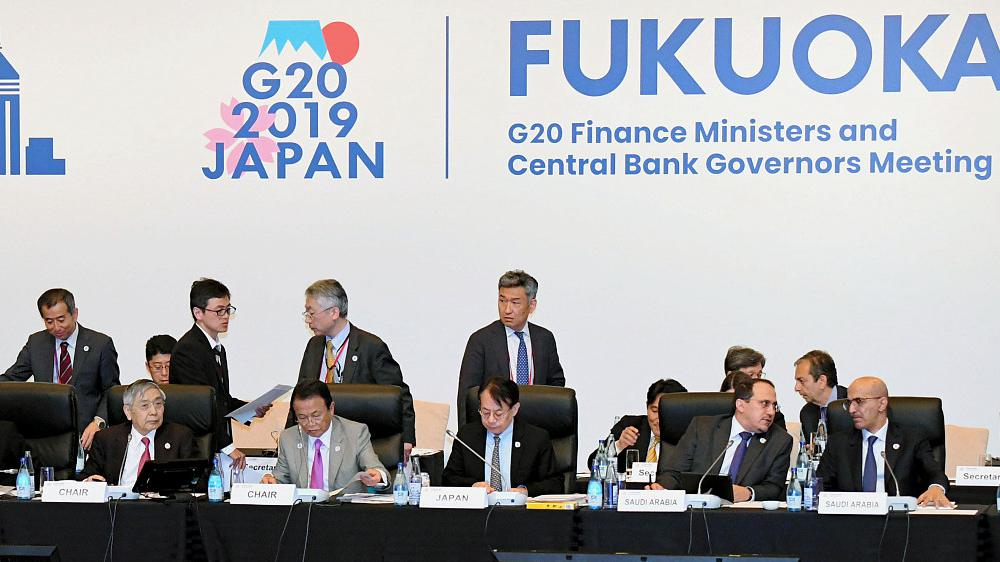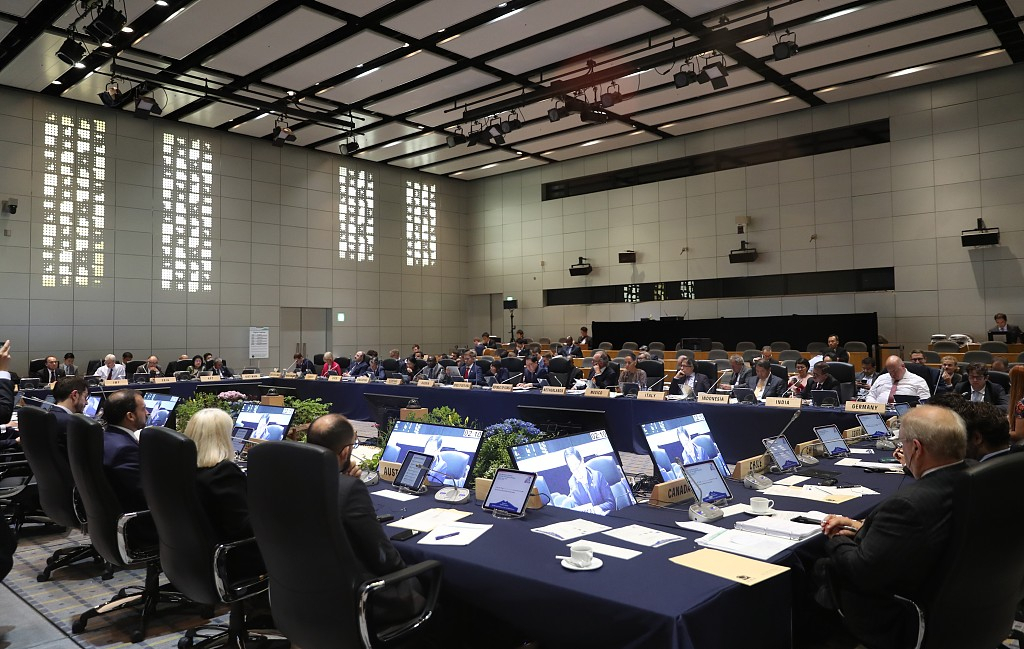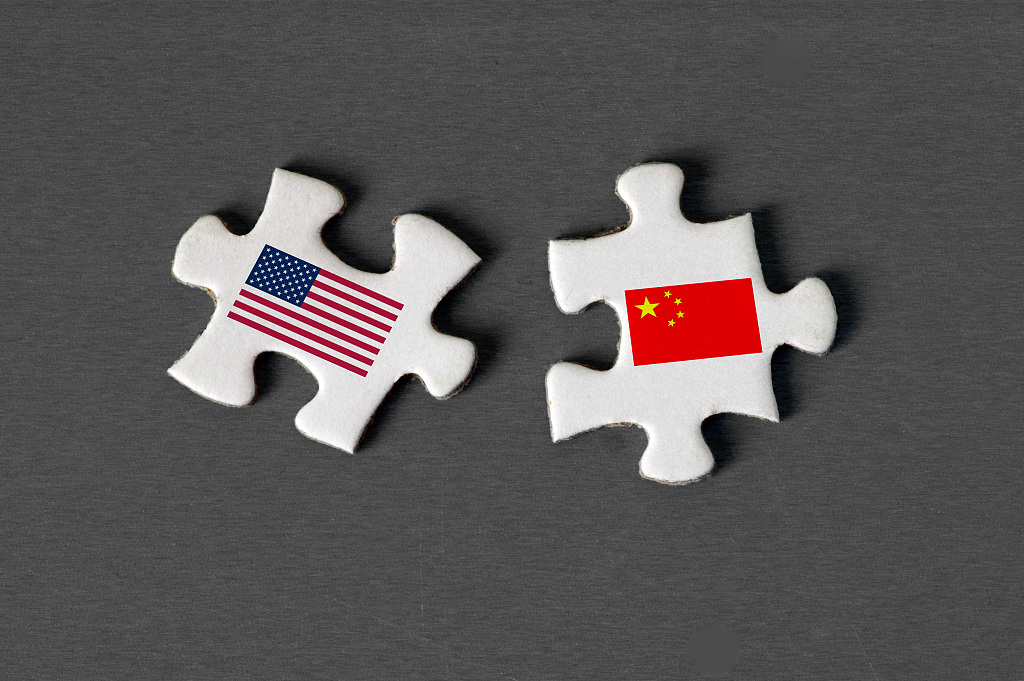

Editor's note: William Jones is the Washington Bureau Chief for Executive Intelligence Review and a non-resident fellow of the Chongyang Institute for Financial Studies, Renmin University of China. The article reflects the author's opinion, and not necessarily the views of CGTN.
The world breathed a sigh of relief when it was announced that President Donald Trump and President Xi Jinping spoke by phone and then announced that they will be meeting on the sidelines of the Osaka G20 summit. Not only Wall Street, which quickly revived on the news, but also Main Street felt relieved. The overhanging crisis engendered by the trade dispute was felt by most people as a threat to their livelihoods. And the fact that the phone call was initiated by the White House indicated that perhaps President Trump was prepared to find a solution and would recede from his policy of “maximum pressure.”
Nevertheless, skepticism reigns after the last weeks and months of increasing tension and rather belligerent statements coming out of the administration as well as President Trump’s tweets on the trade issue. And yet even during his rather raucous “town hall” in Orlando where he announced he was a candidate for 2020, where he did some breast-beating about how tough he had been on China, he again praised President Xi. But is this personal relationship, which for all appearances is genuine, enough to lead to an agreement which will take the world away from the threat of a major trade war and more?
With regard to the policy that has been implemented up until now, Trump seems to have listened to his rather abrasive director of the Office of Trade and Manufacturing Policy, Peter Navarro, whose anti-China views are well-known. The fact that Navarro has been getting some unexpected coverage on the major networks recently also indicates that he has been taken off the “leash” that some of the more astute Trump advisers had placed on him.

General view of the G20 Ministerial Meeting on Trade and Digital Economy at Tsukuba International Conference Center in Ibaraki Prefecture, Japan, June 9, 2019. /VCG Photo
Recent economic figures indicate that the trade dispute and the tariffs are creating problems for the U.S. economy, and over 600 companies and trade associations wrote to the U.S. president about how continued tariffs will hurt the economy. The companies that have warned that the tariffs will lead to higher prices, like Target, Costco, Walmart and others, cater to the white working and lower-middle class, precisely the base on which President Trump depends.
While they may be showing continued enthusiasm for the Trump program, as manifest at his Orlando rally, as prices rise for their basic goods, including food prices, “Trump in 2020” becomes more of a hard-sell. People have been attracted to his straightforward and aggressive style, but they are looking for real results from his policies. And if these are not forthcoming, the style becomes less attractive.
But President Trump still insists that the U.S. is profiting from the tariffs. It is therefore waiting to see some comprehensive resolution of the “trade dispute” from his meeting with President Xi. While China will no doubt be prepared to purchase more American goods, even though those which would be most sought-after by China are consistently restricted because of “technology transfer” concerns, China will certainly not dismantle their national policy of development in order to comply with the more extreme demands coming from Navarro and from U.S. Trade Representative Robert Lighthizer.
While President Trump is entirely fixated on the trade deficit with China, the most useful approach may be to focus on the broader aspects of the relationship and elements of what China can do to actually help the President realize other parts of his program.
On the economic side, there is always the issue of his presently stalled infrastructure program. Private industry isn’t going to pay for it and a recalcitrant Congress dominated more and more by never-Trumpers are not even prepared to conduct serious negotiations on the subject. China would have the means to assist in this endeavor.

VCG Photo
While foreign direct investment from China has met with considerable obstacles coming out of the U.S. Congress, if Chinese investment could be channeled through some other mechanism, an infrastructure bank or infrastructure fund, some of the money that is now invested in Treasury bills could be placed in such a fund which would be targeted toward U.S. infrastructure. And such infrastructure would, of course, help to revive the U.S. economy, not only by the direct employment of American labor in its construction, but also through the productivity increase which it would bring to the American economy.
There is also the political advantage that Chinese cooperation would bring with it, not least of all with regard to the relations between the U.S. and the Democratic People's Republic of Korea (DPRK). As the discussions are slated to be broad-ranging, the issue of trade will not be the only focus. The problems that have arisen since the initial positive contacts between President Trump and Kim Jong Un, largely created by the more provocative stance of Secretary of State Mike Pompeo and National Security Adviser John Bolton, could be the focus of more efforts by China to move the process forward.
One would like to have more confidence that solutions will be forthcoming from a meeting between the two presidents. President Trump is often swayed in his views by his impressions in a personal encounter as we have seen on previous occasions. And yet previous fruitful encounters between the two presidents have not led to a more fruitful relationship between the two countries, but rather the reverse.
As he tends to view China as a major competitor, the key will be to find some means of showing him that China’s development can benefit the U.S. Given that President Trump has characterized the measures taken against Huawei as a trade issue rather than a national security issue, perhaps some of these draconian measures can be lifted.
If Trump can be made to see the advantages that China’s development can have for his own programs, perhaps the trade dispute can be put aside or at least placed lower down on the scale of U.S. priorities. If even this much can be done at the upcoming bilateral, it will be a significant step forward.
(If you want to contribute and have specific expertise, please contact us at opinions@cgtn.com)

Copyright © 2018 CGTN. Beijing ICP prepared NO.16065310-3
Copyright © 2018 CGTN. Beijing ICP prepared NO.16065310-3